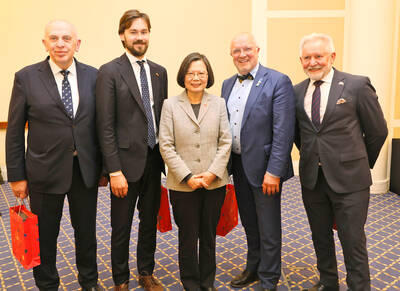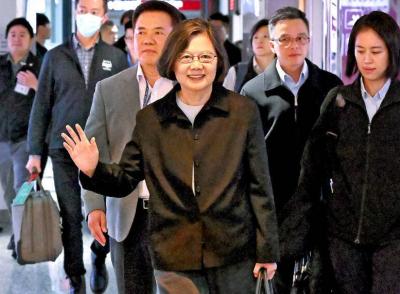The balance of military power between China and Taiwan is shifting toward Beijing, leaving Taiwan few options without US aid in the event of an attack, a threat that has not eased despite warming ties.
China has invested billions of dollars in its military, buying from Russia, developing its own advanced fighter jets and missiles, and slimming its once bloated ranks into a lean and high-tech military, analysts say.
It is also considering building an aircraft carrier.
Taiwan’s forces, by contrast, are increasingly hobbled by outdated systems, unwillingness by almost every country but the US to sell it weapons, and by troop cuts as part of a strategic reduction.
Since taking office last year, President Ma Ying-jeou (馬英九) has eased tensions through trade and tourism deals, a far cry from his predecessor, Chen Shui-bian (陳水扁), who supported formal independence, but military suspicion remains deep.
“They’ve always had a quantitative edge over the Taiwanese, but the Chinese have really closed if not eliminated the qualitative edge the Taiwanese had for decades,” said Richard Bitzinger, senior fellow and Asian military expert at the S. Rajaratnam School of International Studies in Singapore.
China’s overwhelming military superiority, combined with Taiwan’s deepening economic reliance on China and its growing diplomatic isolation, could force a resolution to the sovereignty issue even without a shot having to be fired.
“That’s the intention — to combine growing military leverage and a stronger military, to maybe eventually just present Taiwan with some kind of fait accompli about accepting reunification,” Bitzinger said.
ANNIVERSARY
While Beijing’s language has softened, it is in no mood to let Taiwan go its own way, 60 years after Mao Zedong (毛澤東) proclaimed the founding of the People’s Republic of China.
In July, Chinese Defense Minister Liang Guanglie (梁光烈), while noting “positive changes” in cross-strait relations, pointedly did not offer to pare back forces aimed at Taiwan, nor renounce the use of force to bring Taiwan under China’s control.
“We will firmly hold the theme of peaceful cross-strait development ... oppose the secessionist activities of ‘Taiwan independence’ forces and firmly safeguard China’s sovereignty and territorial integrity,” he was quoted as saying in state media.
VISIT
China has reacted angrily to Taiwan’s decision to allow Tibet’s exiled spiritual leader, the Dalai Lama, to visit this week, in a reminder, if one were needed, that knotty political problems overshadow improving economic and cultural links. China brands the Dalai Lama a separatist.
Taiwan estimates China still has 1,000 to 1,500 missiles aimed at it and Beijing continues to expand its arsenal.
“Given mainland China’s state power and military might, most people wouldn’t believe Taiwan could win a war by itself,” Chinese Nationalist Party (KMT) Secretary-General Wu Den-yih (吳敦義) said.
The RAND Corp, a US-based policy research group, estimated in a recent report that short-range Chinese ballistic missiles could easily destroy the runways of every airbase in Taiwan in a well-targeted initial strike to knock out the air force.
Taiwan’s navy could fare even worse. It has just four submarines, two of which date back to World War II and still have some of their original brass fittings. China has more than 50, a few believed to be armed with nuclear-tipped ballistic missiles.
DESTROYED
“One expects many of Taiwan’s naval vessels will be destroyed very quickly. Taiwan’s fighters and other aircraft would move to airbases where there are underground facilities, but, over time and attrition, most of Taiwan’s fighters would be destroyed or have few places to simply land and refuel,” said Wendell Minnick, Asia bureau chief with Defense News.
While the prospect of war breaking out may seem remote at present, there are no guarantees that Taiwan, a boisterous democracy, will re-elect Ma in presidential elections in 2012.
The Democratic Progressive Party could get back into power with a leader who supports de jure independence from China, which is the red line where Beijing has said it would consider attacking.
DEFENSIVE NEEDS
The Obama administration is re-evaluating Taiwan’s “defensive needs” as a whole, US officials in Taipei have said.
China could target missiles at US bases in Japan and the distance across the Pacific Ocean means that reinforcements may reach the arena only after China wins control of Taiwan.
“This geographic asymmetry ... combined with China’s growing capabilities and the lack of basing options for US forces in the vicinity to the Strait, call into question Washington’s ability to credibly serve as guarantor of Taiwan’s security in the future,” RAND wrote.

Former president Tsai Ing-wen (蔡英文) on Monday called for greater cooperation between Taiwan, Lithuania and the EU to counter threats to information security, including attacks on undersea cables and other critical infrastructure. In a speech at Vilnius University in the Lithuanian capital, Tsai highlighted recent incidents in which vital undersea cables — essential for cross-border data transmission — were severed in the Taiwan Strait and the Baltic Sea over the past year. Taiwanese authorities suspect Chinese sabotage in the incidents near Taiwan’s waters, while EU leaders have said Russia is the likely culprit behind similar breaches in the Baltic. “Taiwan and our European

The Taipei District Court sentenced babysitters Liu Tsai-hsuan (劉彩萱) and Liu Jou-lin (劉若琳) to life and 18 years in prison respectively today for causing the death of a one-year-old boy in December 2023. The Taipei District Prosecutors’ Office said that Liu Tsai-hsuan was entrusted with the care of a one-year-old boy, nicknamed Kai Kai (剴剴), in August 2023 by the Child Welfare League Foundation. From Sept. 1 to Dec. 23 that year, she and her sister Liu Jou-lin allegedly committed acts of abuse against the boy, who was rushed to the hospital with severe injuries on Dec. 24, 2023, but did not

LIKE-MINDED COUNTRIES: Despite the threats from outside, Taiwan and Lithuania thrived and developed their economies, former president Tsai Ing-wen said Former president Tsai Ing-wen (蔡英文) on Saturday thanked Lithuania for its support of Taiwan, saying that both countries are united as partners in defending democracy. Speaking at a reception organized by the Lithuania-Taiwan Parliamentary Friendship Group welcoming her on her first visit to the Baltic state, Tsai said that while she was president from 2016 to last year, many Lithuanian “friends” visited Taiwan. “And I told myself I have to be here. I am very happy that I am here, a wonderful country and wonderful people,” Tsai said. Taiwan and Lithuania are in similar situations as both are neighbors to authoritarian countries, she

Former president Tsai Ing-wen (蔡英文) is to visit the UK during her ongoing European trip, which originally included only Lithuania and Denmark, her office said today. Tsai departed Taiwan for Europe on Friday night, with planned stops in Lithuania and Denmark, marking her second visit to the continent since her two-term presidency ended in May last year. Her office issued a statement today saying that Tsai would also visit the UK "for a few days," during which she is to meet with UK politicians and Taiwanese professionals, and visit academic and research institutions. Following Tsai's stop in Denmark, she is to visit the